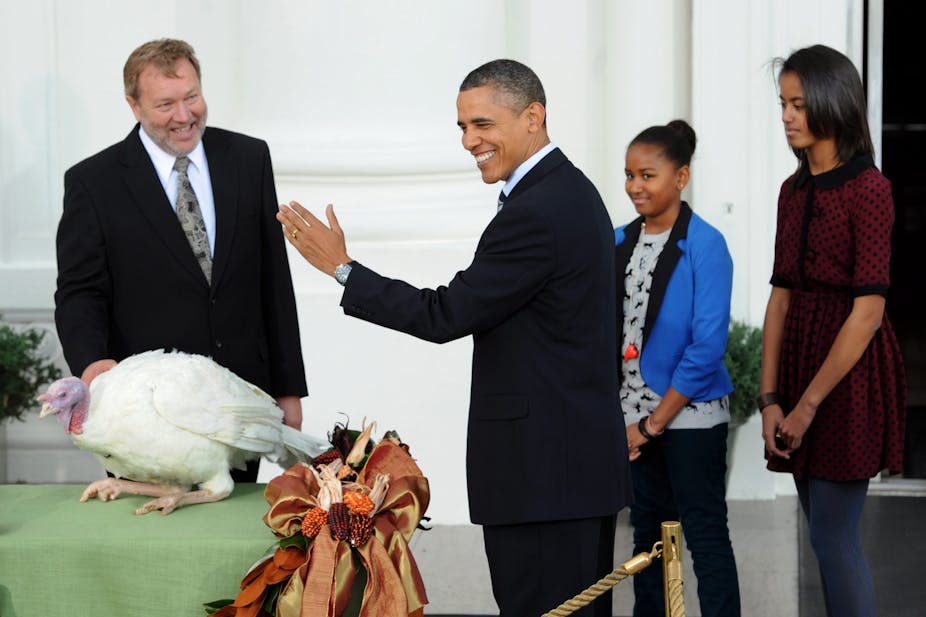The Myanmar government hailed Barack Obama’s recent trip to Burma, the first US president to visit the former military regime, by pardoning 56 prisoners. On his return to the US, President Obama will pardon a Thanksgiving turkey.
As the holiday rolls around each year, one lucky turkey (and his “alternate”) is spared the fate of his tasty brethren. This executive reprieve is followed by the President’s blessing bestowed upon the American people. However, Obama is unlikely to pardon a human if he maintains his profile as the least merciful chief executive in US history.
The President, a former constitutional law professor, performed his first poultripital pardon in 2009, but it took him two years before he pardoned persons convicted of federal offences. After almost four years in power, he has granted only 22 pardons and commuted one prison term. No other chief executive waited so long or pardoned so few.
What accounts for the dwindling number of pardons?
Several explanations have been mooted. Americans’ memory of questionable pardons and dubious pardoning practice means presidential acts of mercy can be risky. President Gerald Ford’s pre-emptive pardon of his predecessor, Richard Nixon, in 1974 cost him an election. The blanket pardon of draft dodgers by President Jimmy Carter in 1977 was a decision critics seized upon to paint Carter as weak on crime. And President Bill Clinton’s pardon of Marc Rich, a convicted swindler and fugitive from justice, who had allegedly contributed to his pardoner’s campaign funds, looked equally crooked. Clinton’s geyser of pardons in the last hours of his administration further prompted calls to clip the presidential prerogative.
Yet it remains constitutional.
Article II, section 2 of the Constitution, authorises the president to grant “reprieves and pardons for offenses against the United States…” The framers decided that one man, chosen by the people to lead, was best suited to temper justice with mercy. But no one in the late-eighteenth century anticipated the President would confront thousands of applications annually, making it necessary to delegate his responsibility.
The Office of the Pardon Attorney, a branch of the federal Attorney General’s Department, was established in 1865 to process pardon applications. Recent exposés have revealed systemic biases in its practice. Investigative journalists with ProPublica and the Washington Post uncovered evidence that since 2000, white applicants have been almost four times as likely as others to be pardoned. The Office’s records confirm African Americans and persons without access to influential advocates, such as a member of Congress, face substantial hurdles when seeking the Presidential pardon.
Rather than perpetuate racist patterns of pardoning, has the White House decided to reduce the number of pardons to a trickle?
President Obama’s cautious approach to pardoning may stem from his effort to work toward a “post-racial” America. At this point, the only prisoner whose sentence he has commuted is an African American woman, released from prison after serving almost half of a twenty-two year sentence for cocaine distribution. Yet in this case it took leading lawyers, Washington lobbyists and the support of a US senator from Obama’s home state (Illinois Democrat Richard J. Durbin) to produce the commutation.

In the meantime tens of thousands of prisoners, disproportionately poor and unable to access the resources necessary to compile a successful clemency petition, continue to serve lengthy sentences at great cost to themselves, their families, communities and tax payers.
In his first bid for office in 2008, Barack Obama criticised the implementation of mandatory minimum sentencing for drug offences, particularly those that dictated heavier sentences for crack cocaine as opposed to pricier powder cocaine.
Not only did mandatory provisions produce a tenfold increase in the federal prison population; in addition, they led to disproportionate rates of African American and Latino imprisonment.
To combat this problem the President signed into law the Fair Sentencing Act in April 2010, which recalibrated mandatory minimum penalties to reduce their discriminatory effects. Yet this law has made little impact on the numbers and racial profile of prisoners serving time in federal prisons for drug offences.
Surprisingly, President Obama, the supposed liberal, makes George W. Bush look like the compassionate conservative he claimed to be. In his eight years in office President Bush pardoned 189 persons and commuted the sentences of 11 prisoners. But he also left his successor with a backlog of 2,173 pending applications. And the number keeps growing, now topping 4,000, the vast majority from currently-serving prisoners.
Pressure is growing for radical reforms to sweep through the Office of the Pardon Attorney. In the meantime, establishing transparent criteria for clemency (such as rectifying gross sentencing disparities due to prosecutorial discretion, or rewarding redemption and reform) could allow the President to revive a moribund practice in a just manner that would stand up to political scrutiny.
Having just returned from Burma, where he lectured the former military dictatorship on the work that remains to be done on the road to democracy, President Obama should have no trouble finding fifty-six worthy pardon and clemency recipients, along with a Thanksgiving turkey.

